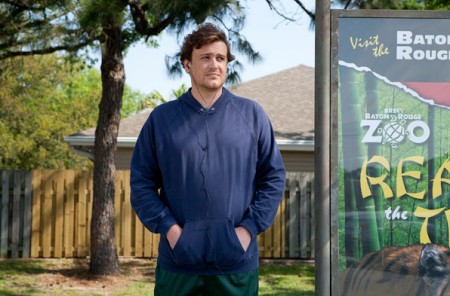
Now that “Spring Break” is over, it’s full steam ahead until May. If you’re a graduating senior or finishing up your graduate program, you’ll probably get stressed by a lot more than just your thesis or crits. You’re wondering where life is headed and if there are any signs in your last semester to guide you along the way, right?
“Jeff, Who Lives at Home”—starring Jason Segel and Ed Helms—surveys a similar mental landscape. The big question is, which character are you: Jeff, who lives in his mother’s basement and is waiting desperately for a signs that lead to his destiny, or his brother Pat (Ed Helms), who seizes almost every opportunity available to succeed. It should be noted here that the writer/directing Duplass brothers have dropped their movie right into the two actors’ hands, as almost every ounce of dialogue is improvised.
I recently sat in on a conference call with Jason Segel and one half of “Jeff’s” writer/directors brothers-duo, Mark Duplass. Wading through the questions on said conference call, I thought about my own question and whether it should be directed at the actor, the director or both. I asked them both: You’ve both seen major success over the last decade, so probably you two aren’t strangers to the concept of change either, right? Jason, many of your characters encounter struggles that involve life changing situations, particularly in “Forgetting Sarah Marshall,” as well as weekly on “How I Met Your Mother.” I wonder what advice you would give the F News readers about how to cope with big life changes?

If you follow the lead of Segel, you’ll fly by the seat of your pants, have a happy-go-lucky existence and everything will work out—the Universe placing you exactly where you need to be, when you need to be there. Segel’s character Jeff operates under much the same M.O., only a little more pessimistic than the actor himself. If you listen to Duplass, you’ll worry about every action and only laugh it off when things actually turn out the way he hoped.
In the movie, Jeff has been struggling to figure his life out since his father passed away as a teenager. As the film opens, the thirty-year-old lives a life of existential contemplation in his mother’s (Susan Sarandon) basement. Preferring the wake-and-bake approach to life—Jeff gets up, smokes from the bong and then sees where the day goes. The phone rings and it’s someone looking for Kevin, who obviously doesn’t live there. A fairly stoned Jeff takes this as a sign, but he’s unsure what exactly to do with it—as apparently he has been with any other sign handed to him in the last fifteen years. Only when his mother calls and orders him to Home Depot for wood glue to fix something in the kitchen, does Jeff spring into action (and I am using the term “action” here pretty loosely). I can’t divulge everything that happens to him, but suffice to say, Jeff spends the day looking for Kevin and finds adventure along the way—mostly with his estranged brother Pat.

Helms’ character Pat has his own unique set of problems—including his mediocre sales career, disenchanted wife and newly purchased (unaffordable) Porsche Boxster. We first meet Pat as he informs his wife of this shiny new German auto. She lambasts him, explaining that she would rather have a house with two-point-two children. We’ve quickly learned that Pat doesn’t really care about anyone at all—other than Pat, that is. The day unfolds as Pat and Jeff’s lives collide through myriad happenstance events.
Obviously, this isn’t a spoiler-type website, so I won’t be telling you exactly how Jeff, Pat and their mother’s day works out. What I will convey is that the movie is pretty humorous, somewhat thought provoking and sometimes poignant. Segel, Helms and Sarandon excel at their improvised characterizations and the production quality of the feature is overall aesthetically pleasing, with well composed shots and mostly pleasant, if not expected transitions throughout the duration. The only thing left for you to do is to decide if and when you’re going to see the movie. Remember though, you’re supposed to decide what you’re doing with the rest of your life after SAIC and in the end, either character will probably get you to where you need to be—maybe? perhaps? sometimes?







